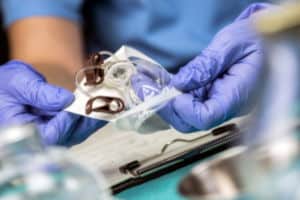
According to the U.S. Food and Drug Administration, Intera Oncology’s Intera 3000 Hepatic Artery Infusion Pumps are being recalled due to dangerous flow rates. The Intera 3000 Hepatic Artery Infusion Pumps can deliver dangerous, faster-than-expected flow rates causing serious injuries or death. The FDA has classified the recall as a Class I recall, which is the […]

Intera 3000 Hepatic Artery Infusion Pump
According to the U.S. Food and Drug Administration, Intera Oncology’s Intera 3000 Hepatic Artery Infusion Pumps are being recalled due to dangerous flow rates. The Intera 3000 Hepatic Artery Infusion Pumps can deliver dangerous, faster-than-expected flow rates causing serious injuries or death. The FDA has classified the recall as a Class I recall, which is the most severe type of recall issued by the FDA. A Class I Recall involved products that can cause severe injuries or death. The affected devices were distributed from August 12, 2021, until May 17, 2022.
The recalled Intera 3000 Hepatic Artery Infusion Pump was used to continually supply medicine through a hepatic artery that supplies oxygen and blood to the liver and other organs. The Intera 3000 Hepatic Artery Infusion Pump is implanted into adults who are receiving chemotherapy drugs to treat liver tumors. Patients implanted with the affected Intera 3000 Hepatic Artery Infusion Pumps can return to daily activities, and they return to the hospital to receive pump refills twice monthly.
If the Intera 3000 Hepatic Artery Infusion Pump delivers infusions to fast, the patient can receive too much chemotherapy medication at one time, causing death, neurotoxicity, and life-threatening hematologic (myelosuppression) toxicity. Also, if the chemotherapy medication flow rate is too fast, the patient will run out of chemotherapy medication long before their next pump refill occurs, which can cause death or cause their disease to progress.
According to the recall report, there have been three incidents reported.
On July 10, 2022, Intera Oncology published a warning by letter, email, or phone call explaining to customers the issue and requesting the following actions:
Healthcare professionals and patients should report adverse reactions experienced while using these medical devices to MedWatch by using an online form, Fax, or regular mail.
Did you or a loved one sustain harm due to a recalled medical device? Parker Waichman LLP helps those who have suffered product injuries receive full monetary compensation. Trust your case with our product injury lawsuit lawyers. For a free consultation, contact our law firm today by using our live chat or calling 1-800-YOUR-LAWYER (1-800-968-7529).


